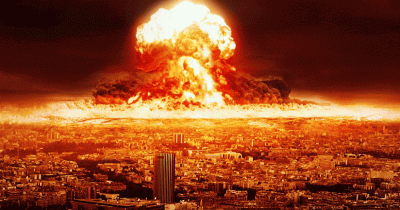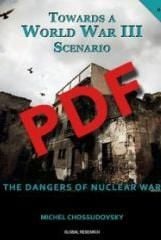Does US-NATO Want Nuclear War?
In a nuclear war scenario there would be no true winners.

All Global Research articles can be read in 51 languages by activating the “Translate Website” drop down menu on the top banner of our home page (Desktop version).
To receive Global Research’s Daily Newsletter (selected articles), click here.
Visit and follow us on Instagram, Twitter and Facebook. Feel free to repost and share widely Global Research articles.
***
On May 1 US lawmaker Adam Kinziger in an interview at CBS, talked about his proposed bill which would authorize the American President to use the Armed Forces against Russia to protect its “national security interests” and to “restore the territorial integrity of Ukraine” upon confirmation Moscow has used weapons of mass destruction. This bill is part of a larger trend. It appears part of the North-American political and military elite desires direct war with the Russian Federation – even risking nuclear conflict.
Last month, US Senator Chris Coons said Washington should “not merely send arms to Ukraine” but rather should consider sending US “troops to the aid in defense” of that country. These US officials are basically stating that a regional conflict should turn into a NATO-Russia war (thus making it an existential issue for Moscow) and potentially escalating into global and nuclear warfare.
This is the worrisome culmination of a kind of rhetoric that has been going on since the beginning of the current conflict. On February 23 French Foreign Minister Jean-Yves Le Drian said during a news conference that Russian President Vladimir Putin should understand that “NATO is a nuclear alliance”.
One month before Moscow started its current military operations in Ukraine, Evelyn N. Farkas (who is a former senior advisor to the Supreme Allied Commander, NATO, and who served as a deputy assistant secretary of defense for Russia, Ukraine, Eurasia in the Obama administration) argued that Washington should issue the Kremlin an ultimatum (demanding it not attack Kiev). She urged the US to organize “coalition forces” to take action to “enforce” such an ultimatum and even use the American military “to roll back Russians – even at risk of direct combat.” She could not have been more clear. But she does not seem to be an isolated voice.
Shortly after the current crisis began, three retired US generals, George Joulwan, Wesley Clark, and Philip Breedlove (all of them being former NATO commanders) proposed the establishment of a no-fly zone over Ukraine, which would have the effect of bringing Russian and American military closer into lethal conflict and war.
Robert C. O’Brien, chairman of American Global Strategies LLC and a former White House national security adviser (2019-2021), in his April 19 opinion piece, proposed a series of responses aimed at “deterring nuclear war”. They include “sending a message” to the Kremlin about the consequences of employing nuclear weapons.
Basically, American strategists are worried – so they claim – that the Kremlin could use the nuclear option and thus they are advocating Washington do it first – or at least prepare itself for that – in a dangerous kind of reasoning that only fuels further escalation.
Seth Cropsey, who is a maritime defense strategy expert and a former Secretary of Defense assistant (under Reagan) and is also an influential lobbyist and political figure in Washington today goes beyond O’Brien proposal, arguing that the United States needs to be prepared to actually “win a nuclear war”. This seems to make sense even, from an American perspective, but the very concept of “winning” a nuclear conflict is problematic – and it is problematic not only from the US point of view, but from humanity’s perspective really.
Nuclear weapons today are way more powerful than the atomic bombs of 1945 – the only time any such arms have been ever employed so far. Today, the two bombs dropped on Hiroshima and Nagasaki would be considered “low-yield”. Some of the current thermonuclear weapons which Russia and the United States possess are over 3,000 times as powerful as the Hiroshima and Nagasaki bombs.
The largest nuclear weapon ever tested so far was the so-called Tsar Bomba, detonated over the Novaya Zemlya island (north of the Arctic Circle) in 1961 by the Soviet Union – it produced a 50 megaton blast and a mushroom cloud about 4.5 times the height of Mount Everest. People were able to see its flash from up to 630 miles (1013 kilometers) away.
One 100-kiloton nuclear bomb dropped on New York City, for example, could kill over 580 thousand people, according to Nukemap, a Stevens Institute of Technology-sponsored website. Therefore, a nuclear war today would be destructive beyond imagination.
A 2019 scientific study involving experts from the US National Center for Atmospheric Research, the Rutgers University’s Department of Environmental Sciences, and other institutions analyzed a scenario in which India, a nuclear power, employs strategic weapons to attack the urban centers of its nuclear power rival, Pakistan. The study concluded that in this scenario there would be up to 125 million deaths. Moreover, besides spreading dangerous levels of radioactivity, the nuclear-ignited fires would release up to 36 Tg of black carbon smoke which would reach the upper atmosphere, thus blocking out the sun and thereby dropping temperatures globally to unprecedented levels and also reducing precipitation up to 30%. Amid this darkness and drought, food production would surely collapse, causing global famine and further collateral fatalities. Recovery would take at least 10 years and the political, economic, social, and psychological impacts worldwide could simply destroy modern civilization. It is merely logical to assume a similar scenario would ensue if a nuclear conflict involving Russia and NATO took place.
The dangerous times we are living require good diplomacy and lots of table talks.
Instead of discussing “nuclear primacy” scenarios, responsible Western leaders should work to reopen diplomatic communication channels with Moscow. The hard truth is that in a nuclear warfare scenario there will be no true winners.
*
Note to readers: Please click the share buttons above or below. Follow us on Instagram, Twitter and Facebook. Feel free to repost and share widely Global Research articles.
Uriel Araujo is a researcher with a focus on international and ethnic conflicts.
 “Towards a World War III Scenario: The Dangers of Nuclear War”
“Towards a World War III Scenario: The Dangers of Nuclear War”
by Michel Chossudovsky
Available to order from Global Research!
ISBN Number: 978-0-9737147-5-3
Year: 2012
Pages: 102
PDF Edition: $6.50 (sent directly to your email account!)
Michel Chossudovsky is Professor of Economics at the University of Ottawa and Director of the Centre for Research on Globalization (CRG), which hosts the critically acclaimed website www.globalresearch.ca . He is a contributor to the Encyclopedia Britannica. His writings have been translated into more than 20 languages.
Reviews
“This book is a ‘must’ resource – a richly documented and systematic diagnosis of the supremely pathological geo-strategic planning of US wars since ‘9-11’ against non-nuclear countries to seize their oil fields and resources under cover of ‘freedom and democracy’.”
–John McMurtry, Professor of Philosophy, Guelph University
“In a world where engineered, pre-emptive, or more fashionably “humanitarian” wars of aggression have become the norm, this challenging book may be our final wake-up call.”
-Denis Halliday, Former Assistant Secretary General of the United Nations
Michel Chossudovsky exposes the insanity of our privatized war machine. Iran is being targeted with nuclear weapons as part of a war agenda built on distortions and lies for the purpose of private profit. The real aims are oil, financial hegemony and global control. The price could be nuclear holocaust. When weapons become the hottest export of the world’s only superpower, and diplomats work as salesmen for the defense industry, the whole world is recklessly endangered. If we must have a military, it belongs entirely in the public sector. No one should profit from mass death and destruction.
–Ellen Brown, author of ‘Web of Debt’ and president of the Public Banking Institute

